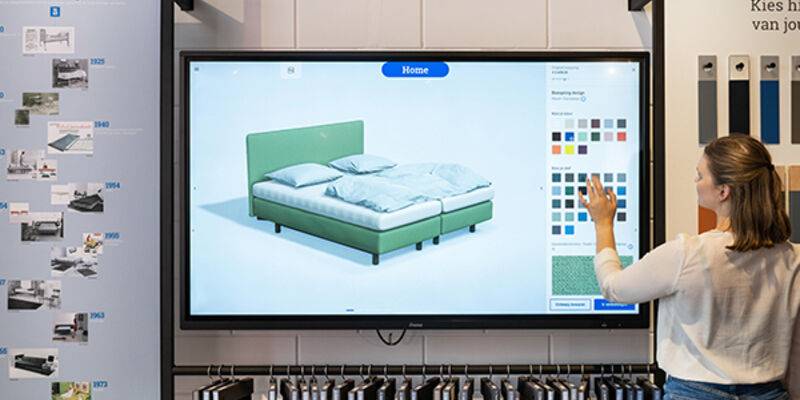Basic-Fit wants to continue to grow in the coming year to 1,250 fitness clubs by the end of 2022. Increasingly, those clubs will be open 24 hours a day. That requires a flexible, scalable and robust network. By switching to Fortinet technology, the Hoofddorp-based fitness chain is taking an important step forward. Simac coordinates the rollout and provides management. IT service manager Reinier Heijne: "We now have much more insight and grip on failures."
"At Basic-Fit, members get great value for money. In addition, what appeals to members is that half of the clubs are open 24 hours a day. And with one pass they can get in at any club."

On October 5, Basic-Fit opened the doors of its 1,000th club. The company has become the largest and fastest growing fitness chain in Europe. More than two million members work on their physical and mental health in clubs in the Netherlands, Belgium, Luxembourg, France and Spain. In these five countries there is room for as many as 2,000 clubs in total. Basic-Fit is ambitious and wants to accelerate the growth of recent years.
Provider-independent
Rapid growth was one of the reasons for Basic-Fit to invest in a new network in 2019. Until then, that consisted of five separate MPLS (Multi Protocol Label Switching) networks, one for each country. In addition, a sixth MPLS network was needed to connect the five national networks with each other and with the headquarters in Hoofddorp. The result was a system of relatively expensive, private networks with little room for flexibility. "Each MPLS network was provided by a different provider. If we wanted to open a new club somewhere, we had to rely on the provider in that country to establish the connection," Heijne says.
With the investment in SD-WAN (Sofware-Defined Wide Area Network), Basic-Fit is able to operate provider-independent. Because SD-WAN uses the Internet, any Internet connection is sufficient to connect a new club. That can be a DSL connection, but also a fiber or coaxial connection, whatever is available. "We can now turn to any provider. In France, for example, you can have a fiber connection with unprecedented speed for four tens. That makes us flexible and scalable."
24 hours a day
Basic-Fit had other reasons to renew the network. One important one is redundancy. "Every club now gets a 4G connection as a backup. If the landline goes down, this 4G connection takes over," states Heijne. Especially for the clubs that are open 24 hours a day, this is a must.
"That requires a smart monitoring system that ensures our members can exercise day and night in a safe environment. For example, in each club there is a button that allows members to get the right support at any time. In addition, a smart camera system has been installed that quickly and accurately detects any unnatural movement and sounds the alarm. More and more fitness equipment is also connected to the network. All that requires a robust network. If that is down and there is no longer a connection, a backup line in the form of a 4G connection is necessary."
Integrated security
The search for a new network led to Fortinet. What particularly appealed to Heijne was the way security technology was integrated into Fortinet's network technology. With this Security-Fabric concept, all clubs including the equipment can be properly secured. One of the components of the Security-Fabric is FortiGate, a firewall solution that can be expanded with FortiSwitches for port security. Because the firewall and switches are optimally connected, each "gateway" can be secured without installing antivirus software on each device. "In addition, we use FortiNAC, where NAC stands for Network Access Control. With this we control access to the network. If someone from outside at our headquarters plugs his device into our network, he will access the Internet but not our network. And if he plugs in a device in our clubs, he won't access the Internet either. We don't want people messing around in our network with devices we don't know about."
Delivery, rollout and management
Basic-Fit has chosen Simac as its partner for the delivery, rollout and management of the new network. All new clubs will be equipped with Fortinet technology as standard. The existing clubs will be transferred country by country, depending on when the existing MPLS contracts expire. Heijne:
"The 50 clubs in Spain and the 10 clubs in Luxembourg are already done. Right now we are working on the 200-plus clubs in Belgium and the 500 clubs in France. Next year it will be the turn of the clubs in the Netherlands. By the end of 2022, the entire network should be running on Fortinet technology."
The physical installation is done by partners of Basic-Fit. Simac prepares the equipment at the branch in Veldhoven and sends it to the relevant club. The moment the equipment is actually installed, Simac can set it up remotely and put it on the air. Heijne: "From that moment on, management also lies with Simac. They are responsible for solving malfunctions."
More insight
Basic-Fit continues to keep a finger on the pulse when it comes to network management. Heijne mentions the deployment of the 4G connection as an example:
"That's a relatively expensive connection with limited bandwidth. When the fixed network is down and the 4G connection is switched on, we don't want to send massive amounts of data because of the costs. Therefore, in consultation with Simac, we decided to block Wi-Fi traffic at those times. Simac then implements that."
To gain insight into network performance, Basic-Fit recently started using the Simac Remote Management Suite (SRMS). "We now have a dashboard that provides much more insight into failures than we have ever had before. In the past, many failures remained invisible. If the network was down, employees would manually let members in without reporting the outage. Now we have a much better grip on that. And we're very happy with that."












